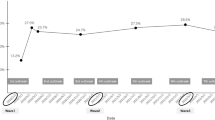Abstract
The purpose of this paper is to focus on major Japanese IT companies whose usage rate of telework has increased rapidly due to the COVID-19 disaster, and to consider issues and measures for improving productivity and performance by using telework.
In this survey, we conducted a questionnaire survey of employees at major IT companies based on Herzberg’s theory of motivation, and we analyzed the correlation between the work environment and productivity awareness before and after the COVID-19 pandemic.
As a result, we confirmed that major Japanese IT companies have not been able to actively utilize telework and adapt to the working environment, work environment, and corporate culture [18] that contribute to productivity improvement.
In addition, because of the correlation analysis, “The working environment for telework in companies has not changed explicitly before and after the corona crisis. There are large individual differences.” The situation was confirmed. However, the absolute number of samples in this questionnaire survey is small, and it is necessary to increase the number of samples and conduct a detailed examination in the future.
Under these circumstances, major Japanese IT companies introduced telework relatively quickly compared to many other companies in other countries and Japan, demonstrating the resilience of their operations.
However, to continuously improve the productivity and performance of employees using telework in the future, it will be necessary to reshape the working environment surrounding telework.
Access this chapter
Tax calculation will be finalised at checkout
Purchases are for personal use only
Similar content being viewed by others
References
Ministry of Internal Affairs and Communications, p.18 (2010a). Ministry of Internal Affairs and Communications, p.37 (2011)
Nikkei Smart Work Management Study Group. Report on Smart Work Management, 7 (2022). 5 July 2022
Criscuolo, C., et al.: OECD productivity working papers. The Role of Telework for Productivity During and Post Covid-19: Results From an Oecd Survey Among Managers and Workers, vol. 31, p. 14 (2021)
Eurofound. Living, Working and COVID-19, COVID-19 series, Publication Office of the European Union, Luxembourg (2020).https://doi.org/10.2806/467608
Nikkei Smart Work Management Study Group. Report on Smart Work Management 7 (2022). 31 July 2022
Ministry of Internal Affairs and Communications. The White Paper on Information and Communications in Japan 2021 (2021)
The Telework Comprehensive Portal. https://telework.mhlw.go.jp/telework/about/
Shimozaki, C.: Conformity and contradiction between telework and Japanese personnel system reform. Kokumin Keizai Zasshi 184(1), 1–17 (2001)
Sato, A.: Telework and workplace transformation, the Japan Institute of Labor 627, 58–66 (2012)
Furukawa, Y.: Telework and the productivity of white-collar workers. J. Policy Studies 39 (2011)
Nikkei Smart Work Management Study Group.Report on Smart Work Management 7 (2022). 7 July 2022
Sahori, D.: A Study on lmplementation of an Organizational Telework. Japan Telework Soc. 1(1), 79–96 (2002)
Nikkei Smart Work Management Study Group. Report on Smart Work Management, vol. 7, pp. 10 (2022)
Sato, S., Nakamura, H.: A study on the introduction of telework-exploring the relationship between work style and productivity improvement. Keio Business School. Japan (2015)
Herzberg, F.: Motivation to Work (English Edition), Routledge (2017)
Doshisha University. Study on the Improvement Effect of Productivity and Treatment of Japanese Software Engineers: Achievements Report on the Use of a Framework for International Comparative Analysis with Asian and Western Countries (2016)
Okamuro, H.: The effect of inter-firm business collaboration: a comparative analysis of small and large companies using individual data. J. Bus. Res. 10, 35-54 (2007)
Saloner, G., Shepard, A., Podolny, J.: Strategic management, John Wiley & Sons, Inc., 89 (2005)
Author information
Authors and Affiliations
Corresponding author
Editor information
Editors and Affiliations
Rights and permissions
Copyright information
© 2023 The Author(s), under exclusive license to Springer Nature Switzerland AG
About this paper
Cite this paper
Kamoshida, A., Fujii, T., Yating, Y. (2023). Study on the Impact of the Telework on the Employee’s Productivity Improvement and Its Business Performance -Based on a Case Analysis of a Major Japanese IT Company-. In: Uden, L., Ting, IH. (eds) Knowledge Management in Organisations. KMO 2023. Communications in Computer and Information Science, vol 1825. Springer, Cham. https://doi.org/10.1007/978-3-031-34045-1_9
Download citation
DOI: https://doi.org/10.1007/978-3-031-34045-1_9
Published:
Publisher Name: Springer, Cham
Print ISBN: 978-3-031-34044-4
Online ISBN: 978-3-031-34045-1
eBook Packages: Computer ScienceComputer Science (R0)




